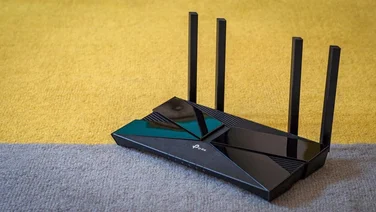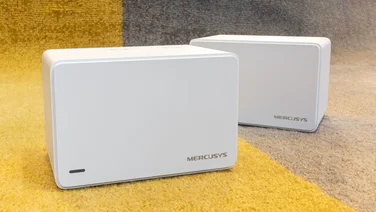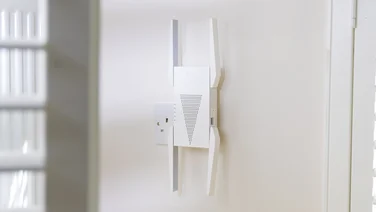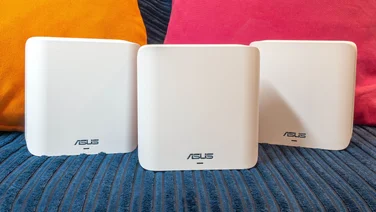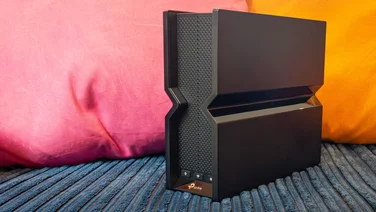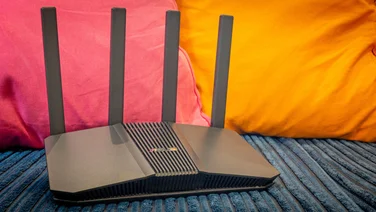To help us provide you with free impartial advice, we may earn a commission if you buy through links on our site. Learn more















- Phenomenal speeds over Wi-Fi 6
- Loaded with multi-gigabit Ethernet ports
- Wi-Fi 7 support is still limited
- Uninspiring management software
- Extraordinarily expensive
If you’re looking for absolutely the fastest home mesh Wi-Fi system around, Netgear has you covered. The Orbi 970 brings Wi-Fi 7 to the company’s mesh Wi-Fi platform, with an enormous claimed throughput of 27Gbits/sec across four radio bands.
It’s not just the performance that’s big. The Orbi 970 units are physically the largest mesh stations we’ve ever seen, and the price is similarly gigantic: you’ll pay £1,500 for two stations, or £2,200 for a triple pack.
Whether it’s worth the money is a slightly tricky question. Today’s drivers and software aren’t yet capable of delivering the full advertised potential of Wi-Fi 7, and that means we can’t be certain how the Orbi 970 will measure up against rival meshes as the technology matures.
For that reason we don’t recommend you spend the cash just yet – but if your goal is to build the fastest, farthest-reaching Wi-Fi network (and cost is no object) the Orbi 970 could well end up being your ideal platform.
Netgear Orbi 970 mesh router review: What you need to know
The Orbi 970 is a Wi-Fi 7 mesh system, available in both two- and three-unit configurations. Netgear claims two stations will cover an area of up to 610m2, while adding a third extends coverage to 930m2. Since a typical UK home has a floor area of around 100m2, the third station will be overkill for most people.
Each Orbi unit has four internal radios, all supporting the latest 802.11be (Wi-Fi 7) standard. The 2.4GHz radio is rated for connection speeds of up to 1.1Gbits/sec, while the main 5GHz radio goes up to 5.8Gbits/sec and the 6GHz radio claims an exceptionally fast top speed of 11.5Gbits/sec.















The fourth radio runs a dedicated 5GHz backhaul network, to ensure station-to-station traffic won’t eat into the bandwidth available to your devices. This connection is rated at up to 8.6Gbits/sec, and the Orbi 970 takes advantage of Wi-Fi 7’s new MLO (multi-link operation) feature to boost performance and stability by additionally carrying backhaul traffic on the 6GHz band.
As usual, all the speeds cited above should be taken with a pinch of salt: they refer to peak Wi-Fi 7 performance with 4×4 MIMO, and assume a perfect, glitch-free radio signal. Most client devices only support 2×2 MIMO, and signal quality can be very inconsistent in real-world environments, so your mileage can and will vary.
Although the Orbi 970’s main attraction is its support for Wi-Fi 7, it will work perfectly well with current devices using Wi-Fi 6 or older standards. The one standard it doesn’t support is Wi-Fi 6E – but that’s not a problem as it delivers excellent performance without it, as we’ll see below.
READ NEXT: Best Wi-Fi extenders
Netgear Orbi 970 mesh router review: Price and competition
Netgear’s mesh systems tend to come with steep prices, and with the Orbi 970 the company has surpassed itself. At £1,500 for two stations or £2,200 for three, this mesh probably costs more than most of the devices you’ll be connecting to it.Still, if you want Wi-Fi 7 you currently have few other options. One is the Netgear Nighthawk RS700S, a standalone Wi-Fi 7 router that can now be had for £700 – still a very high price, but a lot less than a pair of Orbi units.
Alternatively, Amazon’s Eero Max 7 mesh promises whole-home Wi-Fi 7 coverage at £1,150 for two units or £1,700 for three. In our tests it achieved excellent performance over Wi-Fi 6, but Amazon only promises a maximum wireless connection speed of 4.3Gbits/sec – well behind what Netgear claims for the Orbi.
All other meshes we’ve seen are limited to older Wi-Fi standards, but many of them are perfectly fast enough for typical homeworking and media streaming duties – and they’re all a lot cheaper than a Wi-Fi 7 system.
For example, the Netgear Orbi RBKE963 can be had as a pack of two top-spec Wi-Fi 6E stations for £1,200, while the TP-Link Deco XE200 delivers strong speeds for a mere £800. There are numerous budget options, too: if you’re mostly interested in web browsing and video calls, the Mercusys Halo H80X will do a fine job for just £144. See our best mesh Wi-Fi router roundup for our recommendations at all prices.
Netgear Orbi 970 mesh router review: Design and features
The Wi-Fi 7 era introduces a new look for the Orbi platform. Where most previous models had a broad, tapered shape, the 970 units are tall towers, with a rounded triangular footprint and white faces edged in black and gold.















It’s a fairly tasteful design that shouldn’t clash with your home décor, but their sheer size makes these Orbi units unavoidably conspicuous. Standing 294mm tall, with a maximum width of 144mm, they’re hard to hide away, and while there are threaded mounting holes on the base of each station, I can’t imagine that attaching one to a wall or ceiling is going to make it any less obtrusive.
I’m also not in love with the positioning of the status light, which is recessed into the base of each station and can’t be seen if you’re standing over the unit.















There’s more to appreciate at the rear. The main router unit offers a 10GbE internet socket, plus a separate 10GbE LAN port and four 2.5GbE connectors. That’s more wired bandwidth than we’ve seen on any previous mesh, and it ensures that your Ethernet devices won’t end up as second-class clients in the high-speed Wi-Fi 7 era.
Even better, the satellite stations also offer twin 2.5GbE sockets, along with a 10GbE port that can be hooked up to the primary unit for wired backhaul. This gives you rock-solid, ultra-fast wireless connection at long range – as long as you can run a cable between your Orbi stations.















With all this forward-looking hardware on show, it’s disappointing that network management is carried out via the familiar Orbi app and web portal, which have been basically unchanged since 2016. While neither is unusable, their interfaces are clunky in different ways, and their capabilities are frustratingly inconsistent.
The standard feature set is starting to feel quite restricting too. You can configure basic network settings such as port forwarding and IP address reservation, and it’s nice that you get both a secure guest network and an isolated IoT network for untrusted devices. I also like the Wi-Fi scanning tool that’s built into the smartphone app.















As usual, however, there are no band splitting or steering options, no outbound VPN support (though the Orbi does support an inbound OpenVPN server) and no way to connect or share USB peripherals.
My other perpetual gripe with Orbi stuff is that its parental controls and online security features require additional subscriptions. After a 30-day trial of the former you’ll pay £6.99/mth or £50/yr to enable activity monitoring, content filtering and time limits. The Netgear Armor service adds network scanning, malicious content blocking and Bitdefender client software for compatible devices, but while your first year of use is included in the price of the Orbi, it then renews at a steep £85/yr.















I’ve said it many times: after you’ve paid a premium for a high-end Orbi system, these costly add-ons are hard to swallow. TP-Link offers comparable services much more cheaply, while Asus’ parental control and network security features are completely free.
READ NEXT: Best wireless routers
Netgear Orbi 970 mesh router review: Performance
We’re not yet at the point where new laptops are arriving with Wi-Fi 7 as standard, but at the time of writing upgrade cards are starting to trickle onto the market. To put Netgear’s new mesh through its paces, therefore, I invested in a brand-new Intel BE200 card for my test laptop.
This supports Wi-Fi 7 with 2×2 MIMO and a 320MHz channel width, for a maximum connection speed of 5.8Gbits/sec – more than twice the bandwidth of the Intel AX210 Wi-Fi 6E card I was previously using.















Unfortunately, that doesn’t translate to an immediate doubling of download speeds. You can buy the BE200 card today however, Intel hasn’t yet released a feature-complete driver that enables Wi-Fi 7’s performance-maximising MLO capability. Nor does the Orbi 970 currently support MLO for client connections – and, to complete the trifecta of unpreparedness, Windows 11 won’t have full Wi-Fi 7 support until the 24H2 update, which is expected to be released in September.What does this mean for network performance right now? To find out, I put the system through my usual tests. First, I set up the primary Orbi unit in the upstairs study at the front of my home and connected it to an Asustor AS3304T NAS appliance over 2.5GbE. The second Orbi was set at the opposite end of the adjoining bedroom. Although Netgear sent me three units for testing, I left the third one disconnected; my home is nowhere near big enough to require it, and having too many mesh stations with overlapping coverage can actually slow down performance.
I then took my test laptop around various locations in my home, and measured upload and download rates when copying a set of 100MB files to and from the NAS, first over Wi-Fi 6 and then again with Wi-Fi 7. Here are the transfer speeds I saw, along with the best results we’ve obtained from some other mesh systems for comparison:


The Orbi 970’s performance over Wi-Fi 6 was simply superb, racing well past Netgear’s previous flagship mesh, the Wi-Fi 6E Orbi RBKE963. With this sort of bandwidth and range, every member of your family could be watching Netflix, chatting on Zoom and playing games, all in different rooms, all at the same time. Predictably, cheaper meshes couldn’t come close to the Orbi’s pace. The only system in the same class for Wi-Fi 6 performance was the Eero Max 7.
Although the Orbi doesn’t use the 6GHz frequency range for legacy connections, as soon as I moved onto a Wi-Fi 7 connection the system switched to the higher radio band. In these tests I saw some decent performance improvements in the study and living room, but performance dropped off a little towards the rear of the house. That’s to be expected, as higher-frequency radio signals have less range and penetration; hopefully, once MLO is enabled the Orbi will give us the best of both worlds by using both 5GHz and 6GHz frequency bands at once.















For now, while the Orbi 970’s Wi-Fi 7 performance is undeniably strong, I would have to say these results give very little indication of the benefits of the new wireless standard. Perhaps more importantly, they don’t show a meaningful advantage of the Orbi 970 over the cheaper Amazon Eero Max 7.
And like most high-end meshes, the Orbi 970 is pretty power-hungry. I measured a power draw of 27.6W from the primary station when sitting idle, rising to a maximum of 30.2W during my speed tests. The remote station idled at around 21W, so you’re looking at a continual draw of around 50W in total for a two-node system.
Netgear Orbi 970 mesh router review: Should you buy it?
The Orbi 970 offers superb performance and range that will satisfy the biggest, busiest household – and forthcoming updates should only make it faster. I would have liked to see a smarter management interface, with fewer pricey add-ons, but if you’re in the market for a premium Wi-Fi 7 mesh the Orbi 970 is a very strong contender.
Let’s be clear, though: we don’t yet know how fast the Orbi can really go, nor whether its eventual performance will justify the price premium over rival mesh systems. Buy it today and you’ll be spending an enormous sum on what is, frankly, a bit of a gamble.
As with other Wi-Fi 7 systems, therefore, our advice has to be to hold off, for the time being at least. Until the whole market reaches a greater state of maturity – not just the Orbi, but the network cards and operating systems it works with – it’s too early to recommend any Wi-Fi 7 router or mesh.



